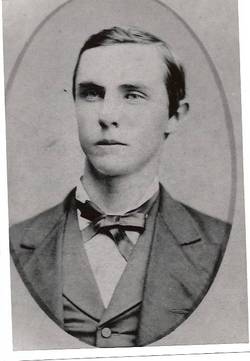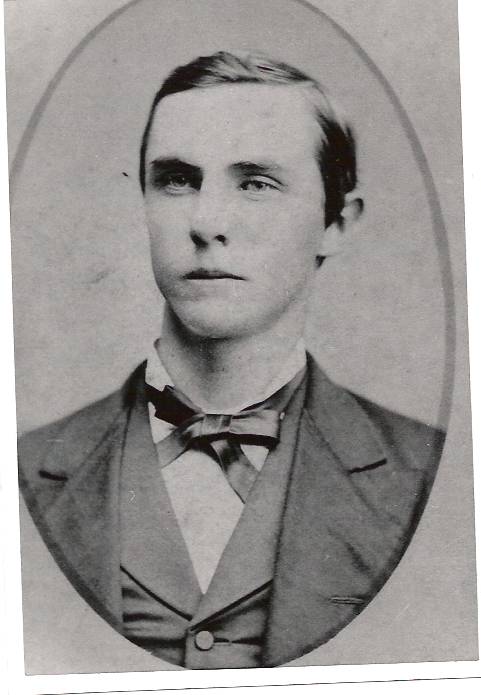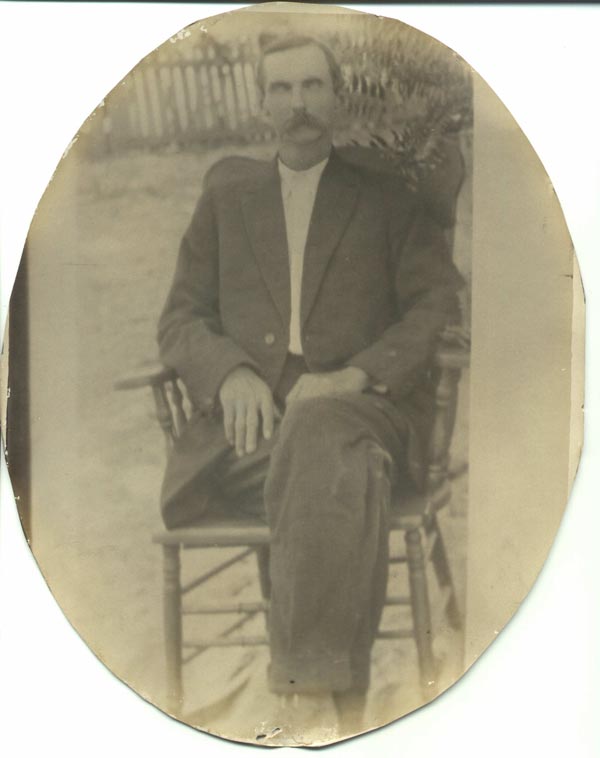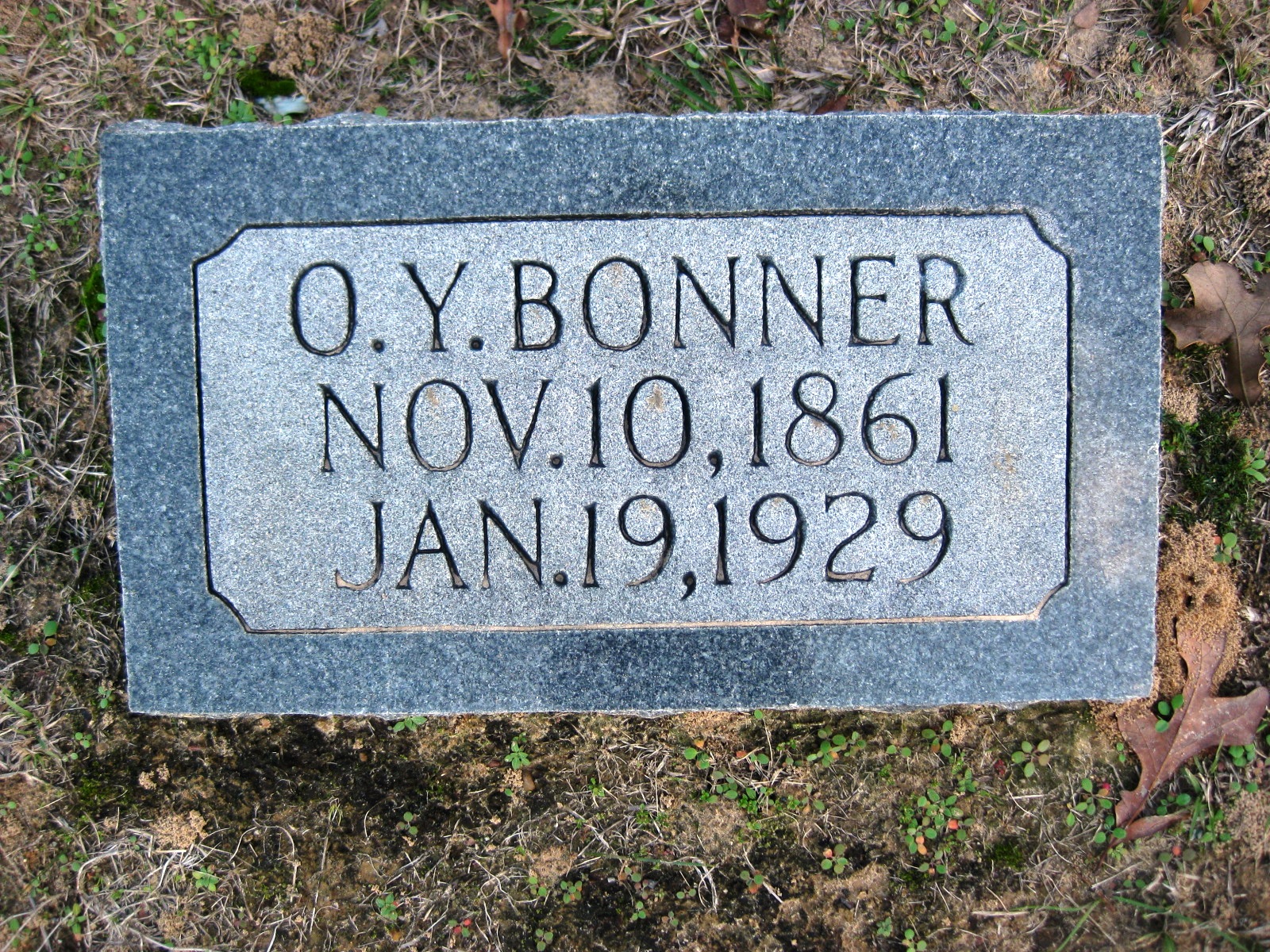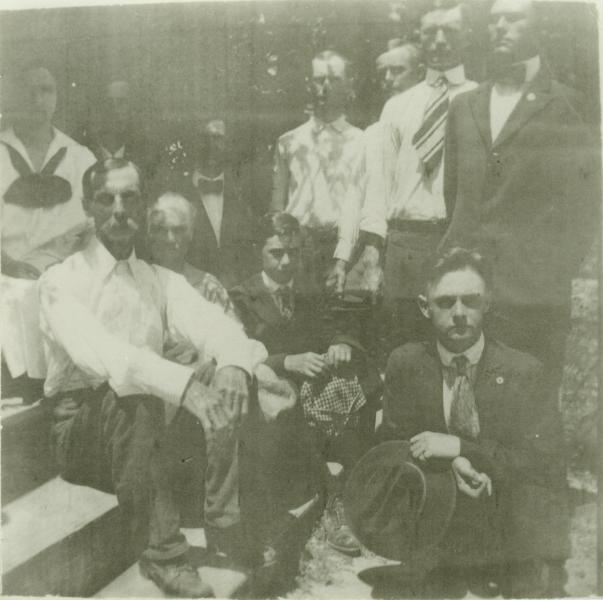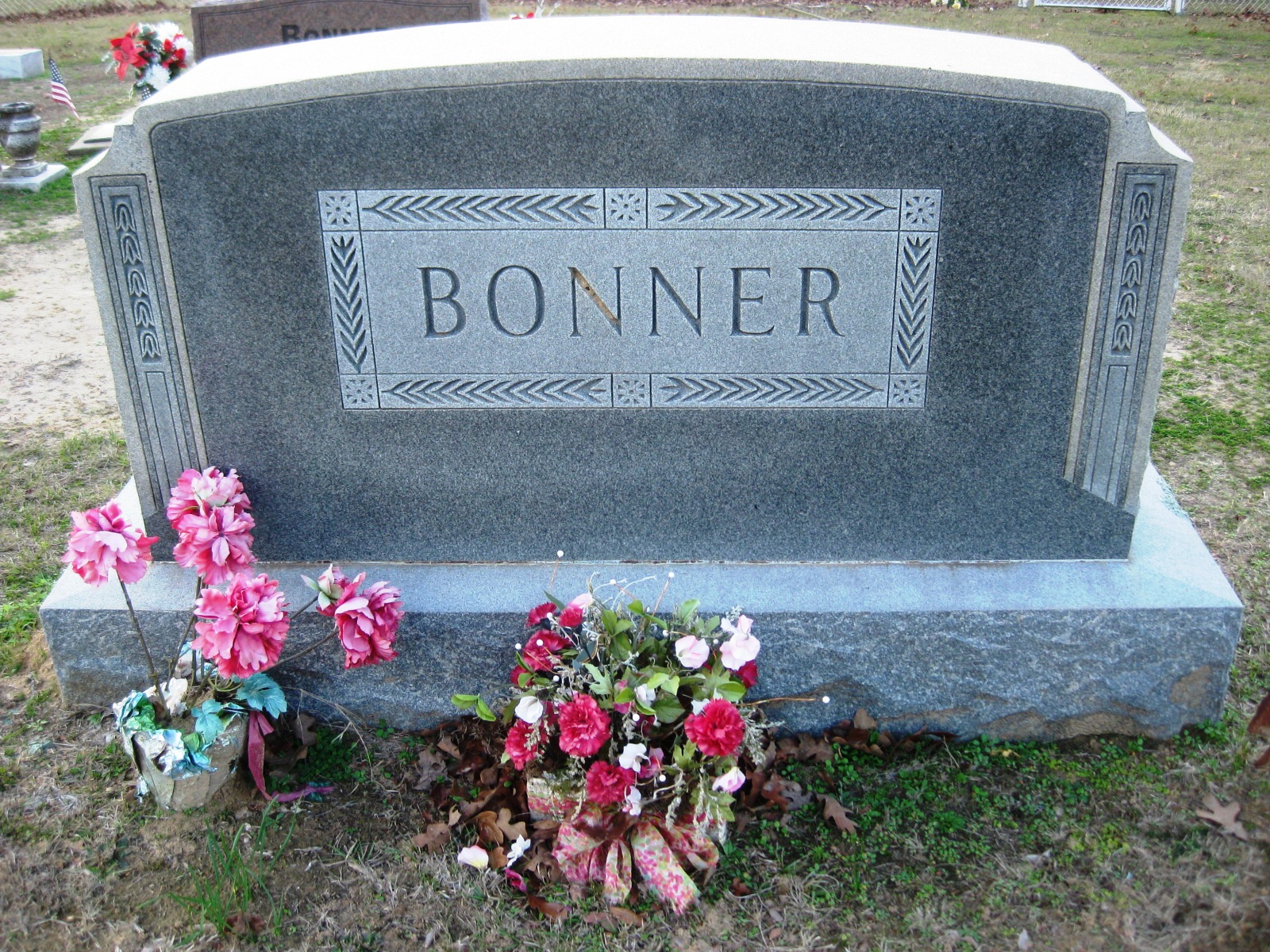Oliver Young Bonner, called Young by his family and friends, grew to manhood in a house near the northwest corner of modern day Farm Road 833 and County Road 121 in Freestone County, Texas. He lived his entire life within a half mile of his birthplace. After his marriage to Sarah Hope "Sallie" Robinson on December 20, 1883 by her uncle, Reverend Thomas Joel Bonner, they made their home just east of his father's house at what is now the northeast corner of those same roads. In later years, they moved the house about a half mile west on Farm Road 833 and lived there. Everyone remembers how deep the sand was around that house making it difficult to drive and hot to walk barefooted. We can only surmise at the events that molded his character. His father's incarceration in a Union prison during the Civil War and the ultimate loss of the family fortune, with the exception of their land, must have played a part. The death of his mother in 1871 when he was only ten years old must have been a big blow. Also affecting him were the deaths of his two older unmarried brothers: Jim Billie died in 1878 at age 21 and Andrew died in 1889 at age 30. His education in a country school provided the basics essential for life while farming skills came from both observing and working.
Young Bonner's physique did not impress. Small in stature and wiry, he worked hard. His grandson, Edd Bonner, recalled, "Grandpa Bonner was a little man like Hugh. He could take a bale of cotton [500 pounds] by the bands and lift it off the ground." He raised fox hounds and enjoyed fox hunting. Young Bonner's main asset was his character. He disciplined his sons by example, a look, or a soft word. He was known far and wide as a good, honest, honorable man. His word was his bond. He enjoyed having peacocks, mules, jacks, jennys, and other animals around. Everyone remembered that Young raised and enjoyed coon hounds. John told the following: "My Daddy got up one morning and I was out to the lot with him. We heard them dogs barking out from the house there in them woods….Papa caught an old mare, throwed me up on it, and said, 'Let's ride out there and see Papa.' His Daddy. They'd treed a dang coon….They sat there and talked awhile and rode around, you know. After a little bit, Grandpa said, 'Well, I reckon we just as well to go.' I said, "Ain't you gonna git him?'….But they left him up a tree. Grandpa he went and stayed out all night by hisself; he'd ride a horse and carry them dogs." However, Young never complained about visitors because "They were Sallie's friends." John L. told the following story about his father's demeanor to Harry Glenn: "One very hot day he [John L.] was plowing in new ground. The gnats or flies were so bad a sack was put over the mules' noses to filter the bugs out. The gnats were all over him. The plowing tough, the mules difficult to control, and he was miserable so he unloaded a good cussing on the mules. He looked up and saw Papa who turned and walked away. John L. felt ashamed the rest of his life." John L. also remembered that every Saturday the boys worked until noon. Then they put the mules up, cleaned up, and Young had saddled their horses and they went to town. No other father did that for his sons. Young also raised cattle and added an O to his father's Z and made his cattle brand OZ.
Ties to the land assumed importance and all the sons pursued agriculture in some form all their lives. Both Young and Sallie emphasized faith by example. Together they formed a home that produced upright and upstanding citizens. They had to make do with what was available. A half-gallon jug of whiskey was kept for medicine. Young served many years as trustee for the Stewards Mill Common School District. He also served as road foreman. Young rode his horse the two miles to Jim Billie's house daily in January 1929 to check on him and his family because they had the flu. As the bridge was out, he had to swim the creek each way. One night Young arrived home, lay down on the hearth, and said, "I'm not going to make it." He developed pneumonia and died at his home on January 19, 1929 with his family gathered around him and was buried beside his parents in the Bonner Cemetery. Pauline remembered being allowed to peek out the kitchen window and see her father Paul driving the wagon that carried Young's coffin to the cemetery. She said it was very cold and the children did not attend the funeral. Pete remembered Cousin Hale Robinson keeping the children in the kitchen.
=====================================================
From the Fairfield Recorder
Tribute of Respect
"Boys, I Am Going Home"
It was evening, and a man with the sunlight in his face was nearing home. The journey had been long and hard and the sky overcast with clouds. But now he was almost home and the gold and crimson lights of sunset was just ahead.
It had been a journey full of toil and self sacrifice. He had not minded the harships so much, for he had early learned that they were to be expected by all who traveled that way.
The shadows were lowering behind him, but the sunset light gleamed before.
He thought of those whom he had loved and helped, yes, but he also thought of those who yet needed even greater help. He know, but they did not; he hesitated to go on, though rest and home were just ahead. Perhaps it was not given him to help any more, for he was very, very tired, so he paused long enough on his homeward journey to pray for those who needed the greater help, the help he himself could not give, and now when he was so near home, he did not regret, but was glad, as glad as one so weary could be. For the simple faith that had not questioned the commands did not question the promise. Often he thought of what seemed to him the little accomplished; but he has tried faithfully to do his best, and he remembered God's mercy.
Home was almost in sight. There were rest and peace and joy without shadow of pair or sorrow. There was something wonderful about his home-going. He himself had announced it. Conscious of it, he said to his sons at his bedside, "Boys, I am going home." And later announced the time. "I am going Saturday."
Wonderful, too, was this home-going for as the light faded in the sunset, a new day would dawn, a day made glorious by the light which filled it, the light of the glory of God. This day would never end.
In place of sorrow and pain and fastings, there would be peace and gladness and meetings wonderful in their joy. There would be glory and joy unspeakable. So the weary traveler journeyed on to the sunset, and at 6:30 PM Saturday, January 19th, 1929, Oliver Young Bonner, son of John L. Bonner and Sarah Elizabeth Bonner, went home.
Mr. Bonner was my friend and while no work of mine could add peace to his ashes or sweetness to his sleep, I beg to place on record my tribute of affection and esteem. The acquaintance which he formed when I became his pastor ripened into an attachment which I enjoyed during his life, and which I cherish in memory now.
He was not a one-sided man, a man with but one idea or virtue. He blended graces and good qualities, so combined the traits and characteristics which distinguish men as to be worthy of Anthony's compliment to Brutus:
"His life was gentle, and the elements
So mixed in him, that nature might stand up
And say to allthe world. This was a man."
He was a man of the home, he found his inspiration at his fireside, and approached the ideal in his domestic life.
He and his faithful wife, Sallie Hope Robinson, whom he married
December 20th, 1883, who was both his help-meet and companion, inhabitants in common in that sacred spot called home, and needed no Court to define their relative rights and duties.
The invisible walls, which shut in that home and shut out all else, had their foundation upon the earth and their battlements in the skies. No force could break them down, no poisoned arrows could cross their top, and the gates thereof, love and confidence, stood ever upon guard.
In such a home the devoted parents reared a loving and dutiful family, eight sons and one daughter, all living but one daughter who died in infancy; Jim Billie, Bettie, Paul, Tom, John L., Joel, Hunter, Oliver and Sneed, these with the wife, one brother, T. H. Bonner, and two half brothers, Wirt and Millen, survive and sorrow, but not as those who have no hope. He lived to see all these noble sons settle in life, and fortune has so smiled upon the children the father was as far removed from anxious care concerning them as his beautiful, peaceful, God-loving home was removed from the noise and turmoil of the busy city.
He did not leave to his children that doubtful blessing, a large fortune, but left the priceless heritage which money cannot buy, a name without stain, a reputation without a blemish.
With him citizenship was a sacred trust as well as a privilege, and in the discharge of its responsibilities he exercised the most conscientious care. He was honest, both with himself and with others. His fidelity to others was insured by strict adherence to the injunction:
"To thine own self be true.
And it must follow, as the night the day,
Thou canst not then be false to any man."
His life was one long journey upwards without a halt or backward step; he pitched his tent on higher ground at the end of each day's travel. Born November 10th, 1861, for sixty-eight years his home was at the Bonner settlement in Freestone County, Texas. There he attended school, spent the days of his boyhood and manhood, and in his youth was baptized, and received into the church by Rev. W. H. Millen, and thereafter, he had almost completed three-score years and ten, he rests from his labors. The sorrowing multitude who attended his funeral and burial in the Bonner Cemetery testified as no language can to the character of the man. Their expressions of tenderness and affection, and their gentle ministration fitly crowned the career of this man, who spent his life for others. "The path of the just is as the shining light, that shineth more and more until the perfect day."
I shall not believe that even now his light is extinguished. If the Father deigns to touch with Divine power the cold and pulseless heart of the buried acorn, and to make it burst forth from its prison walls, will He leave neglected in the earth the soul of man, who was made in the image of his Creator?
If He stoops to give the rosebud, whose withered blossoms float upon the breeze, the sweet essence of another spring time, will He withhold the words of hope from the sons of men, when the frost of winter comes?
If matter, mute and inanimate, though changed by force of nature into a multitude of forms, can never die, will the imperial spirit of man suffer annihilation after it has paid a brief visit, like a royal guest to this tenement of clay?
Rather let us believe that He who, in His apparent prodigality, waste not the rain drop, or the blade of grass, or the evening sighing zephyrs, but make them all carry out His eternal plan, has given immortality to the mortal, and gather to Himself and home the generous spirit of our friend.
Instead of mourning, we look up and address him in the words of the poet:
"The day has come, not gone;
The sun has risen, not set;
Thy life is now beyond
The need of death or change.
Not ended---but begun,
O, Noble Soul; O gentle heart; Hail, our farewell."
J. Walter Simpson - February 14, 1929
=====================================================
Oliver Young Bonner, called Young by his family and friends, grew to manhood in a house near the northwest corner of modern day Farm Road 833 and County Road 121 in Freestone County, Texas. He lived his entire life within a half mile of his birthplace. After his marriage to Sarah Hope "Sallie" Robinson on December 20, 1883 by her uncle, Reverend Thomas Joel Bonner, they made their home just east of his father's house at what is now the northeast corner of those same roads. In later years, they moved the house about a half mile west on Farm Road 833 and lived there. Everyone remembers how deep the sand was around that house making it difficult to drive and hot to walk barefooted. We can only surmise at the events that molded his character. His father's incarceration in a Union prison during the Civil War and the ultimate loss of the family fortune, with the exception of their land, must have played a part. The death of his mother in 1871 when he was only ten years old must have been a big blow. Also affecting him were the deaths of his two older unmarried brothers: Jim Billie died in 1878 at age 21 and Andrew died in 1889 at age 30. His education in a country school provided the basics essential for life while farming skills came from both observing and working.
Young Bonner's physique did not impress. Small in stature and wiry, he worked hard. His grandson, Edd Bonner, recalled, "Grandpa Bonner was a little man like Hugh. He could take a bale of cotton [500 pounds] by the bands and lift it off the ground." He raised fox hounds and enjoyed fox hunting. Young Bonner's main asset was his character. He disciplined his sons by example, a look, or a soft word. He was known far and wide as a good, honest, honorable man. His word was his bond. He enjoyed having peacocks, mules, jacks, jennys, and other animals around. Everyone remembered that Young raised and enjoyed coon hounds. John told the following: "My Daddy got up one morning and I was out to the lot with him. We heard them dogs barking out from the house there in them woods….Papa caught an old mare, throwed me up on it, and said, 'Let's ride out there and see Papa.' His Daddy. They'd treed a dang coon….They sat there and talked awhile and rode around, you know. After a little bit, Grandpa said, 'Well, I reckon we just as well to go.' I said, "Ain't you gonna git him?'….But they left him up a tree. Grandpa he went and stayed out all night by hisself; he'd ride a horse and carry them dogs." However, Young never complained about visitors because "They were Sallie's friends." John L. told the following story about his father's demeanor to Harry Glenn: "One very hot day he [John L.] was plowing in new ground. The gnats or flies were so bad a sack was put over the mules' noses to filter the bugs out. The gnats were all over him. The plowing tough, the mules difficult to control, and he was miserable so he unloaded a good cussing on the mules. He looked up and saw Papa who turned and walked away. John L. felt ashamed the rest of his life." John L. also remembered that every Saturday the boys worked until noon. Then they put the mules up, cleaned up, and Young had saddled their horses and they went to town. No other father did that for his sons. Young also raised cattle and added an O to his father's Z and made his cattle brand OZ.
Ties to the land assumed importance and all the sons pursued agriculture in some form all their lives. Both Young and Sallie emphasized faith by example. Together they formed a home that produced upright and upstanding citizens. They had to make do with what was available. A half-gallon jug of whiskey was kept for medicine. Young served many years as trustee for the Stewards Mill Common School District. He also served as road foreman. Young rode his horse the two miles to Jim Billie's house daily in January 1929 to check on him and his family because they had the flu. As the bridge was out, he had to swim the creek each way. One night Young arrived home, lay down on the hearth, and said, "I'm not going to make it." He developed pneumonia and died at his home on January 19, 1929 with his family gathered around him and was buried beside his parents in the Bonner Cemetery. Pauline remembered being allowed to peek out the kitchen window and see her father Paul driving the wagon that carried Young's coffin to the cemetery. She said it was very cold and the children did not attend the funeral. Pete remembered Cousin Hale Robinson keeping the children in the kitchen.
=====================================================
From the Fairfield Recorder
Tribute of Respect
"Boys, I Am Going Home"
It was evening, and a man with the sunlight in his face was nearing home. The journey had been long and hard and the sky overcast with clouds. But now he was almost home and the gold and crimson lights of sunset was just ahead.
It had been a journey full of toil and self sacrifice. He had not minded the harships so much, for he had early learned that they were to be expected by all who traveled that way.
The shadows were lowering behind him, but the sunset light gleamed before.
He thought of those whom he had loved and helped, yes, but he also thought of those who yet needed even greater help. He know, but they did not; he hesitated to go on, though rest and home were just ahead. Perhaps it was not given him to help any more, for he was very, very tired, so he paused long enough on his homeward journey to pray for those who needed the greater help, the help he himself could not give, and now when he was so near home, he did not regret, but was glad, as glad as one so weary could be. For the simple faith that had not questioned the commands did not question the promise. Often he thought of what seemed to him the little accomplished; but he has tried faithfully to do his best, and he remembered God's mercy.
Home was almost in sight. There were rest and peace and joy without shadow of pair or sorrow. There was something wonderful about his home-going. He himself had announced it. Conscious of it, he said to his sons at his bedside, "Boys, I am going home." And later announced the time. "I am going Saturday."
Wonderful, too, was this home-going for as the light faded in the sunset, a new day would dawn, a day made glorious by the light which filled it, the light of the glory of God. This day would never end.
In place of sorrow and pain and fastings, there would be peace and gladness and meetings wonderful in their joy. There would be glory and joy unspeakable. So the weary traveler journeyed on to the sunset, and at 6:30 PM Saturday, January 19th, 1929, Oliver Young Bonner, son of John L. Bonner and Sarah Elizabeth Bonner, went home.
Mr. Bonner was my friend and while no work of mine could add peace to his ashes or sweetness to his sleep, I beg to place on record my tribute of affection and esteem. The acquaintance which he formed when I became his pastor ripened into an attachment which I enjoyed during his life, and which I cherish in memory now.
He was not a one-sided man, a man with but one idea or virtue. He blended graces and good qualities, so combined the traits and characteristics which distinguish men as to be worthy of Anthony's compliment to Brutus:
"His life was gentle, and the elements
So mixed in him, that nature might stand up
And say to allthe world. This was a man."
He was a man of the home, he found his inspiration at his fireside, and approached the ideal in his domestic life.
He and his faithful wife, Sallie Hope Robinson, whom he married
December 20th, 1883, who was both his help-meet and companion, inhabitants in common in that sacred spot called home, and needed no Court to define their relative rights and duties.
The invisible walls, which shut in that home and shut out all else, had their foundation upon the earth and their battlements in the skies. No force could break them down, no poisoned arrows could cross their top, and the gates thereof, love and confidence, stood ever upon guard.
In such a home the devoted parents reared a loving and dutiful family, eight sons and one daughter, all living but one daughter who died in infancy; Jim Billie, Bettie, Paul, Tom, John L., Joel, Hunter, Oliver and Sneed, these with the wife, one brother, T. H. Bonner, and two half brothers, Wirt and Millen, survive and sorrow, but not as those who have no hope. He lived to see all these noble sons settle in life, and fortune has so smiled upon the children the father was as far removed from anxious care concerning them as his beautiful, peaceful, God-loving home was removed from the noise and turmoil of the busy city.
He did not leave to his children that doubtful blessing, a large fortune, but left the priceless heritage which money cannot buy, a name without stain, a reputation without a blemish.
With him citizenship was a sacred trust as well as a privilege, and in the discharge of its responsibilities he exercised the most conscientious care. He was honest, both with himself and with others. His fidelity to others was insured by strict adherence to the injunction:
"To thine own self be true.
And it must follow, as the night the day,
Thou canst not then be false to any man."
His life was one long journey upwards without a halt or backward step; he pitched his tent on higher ground at the end of each day's travel. Born November 10th, 1861, for sixty-eight years his home was at the Bonner settlement in Freestone County, Texas. There he attended school, spent the days of his boyhood and manhood, and in his youth was baptized, and received into the church by Rev. W. H. Millen, and thereafter, he had almost completed three-score years and ten, he rests from his labors. The sorrowing multitude who attended his funeral and burial in the Bonner Cemetery testified as no language can to the character of the man. Their expressions of tenderness and affection, and their gentle ministration fitly crowned the career of this man, who spent his life for others. "The path of the just is as the shining light, that shineth more and more until the perfect day."
I shall not believe that even now his light is extinguished. If the Father deigns to touch with Divine power the cold and pulseless heart of the buried acorn, and to make it burst forth from its prison walls, will He leave neglected in the earth the soul of man, who was made in the image of his Creator?
If He stoops to give the rosebud, whose withered blossoms float upon the breeze, the sweet essence of another spring time, will He withhold the words of hope from the sons of men, when the frost of winter comes?
If matter, mute and inanimate, though changed by force of nature into a multitude of forms, can never die, will the imperial spirit of man suffer annihilation after it has paid a brief visit, like a royal guest to this tenement of clay?
Rather let us believe that He who, in His apparent prodigality, waste not the rain drop, or the blade of grass, or the evening sighing zephyrs, but make them all carry out His eternal plan, has given immortality to the mortal, and gather to Himself and home the generous spirit of our friend.
Instead of mourning, we look up and address him in the words of the poet:
"The day has come, not gone;
The sun has risen, not set;
Thy life is now beyond
The need of death or change.
Not ended---but begun,
O, Noble Soul; O gentle heart; Hail, our farewell."
J. Walter Simpson - February 14, 1929
=====================================================
Family Members
-
![]()
Jim Billie Bonner
1885–1938
-
![]()
Sarah Elizabeth "Bettie" Bonner
1887–1943
-
![]()
Paul Young Bonner
1888–1974
-
![]()
Tom Robinson Bonner
1891–1961
-
![]()
Infant Daughter Bonner
1892–1892
-
![]()
John Lee "John L." Bonner
1893–1983
-
![]()
Joel Isaac Bonner
1895–1972
-
![]()
Irvin Hunter "Hunter" Bonner
1898–1985
-
![]()
Oliver Alexander "Ol" Bonner
1900–1953
-
![]()
Andrew Sneed Bonner
1904–1993
Sponsored by Ancestry
Advertisement
Explore more
Sponsored by Ancestry
Advertisement
